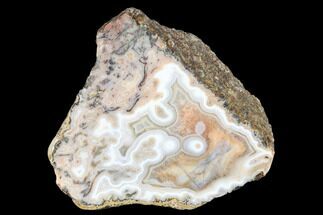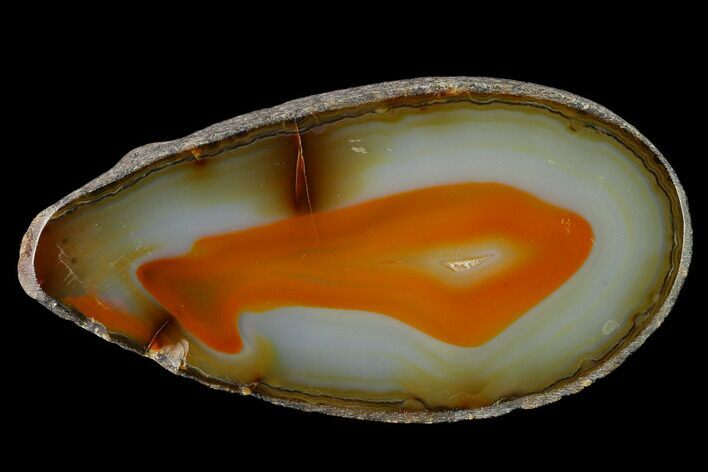This Specimen has been sold.
4.2" Cut & Polished Brazilian Agate
This is a gorgeous, 4.2" wide, cut & polished Brazilian agate.. One face has been polished while the exterior of agate formation has been left rough.
Agate is a translucent variety of microcrystalline quartz. Agate primarily forms when silica-rich fluids fill pockets within rock and/or fossils, depositing it along the walls of the rock. This process can result in banding patterns as fluid compositions and impurities change over time. These banding patterns can either form as flat layers, forming agates known as waterline agates, or as concentric layers typical of most agates, depending on the surfaces available for deposition.
Agate has also been known to fill veins or cracks in volcanic rock. Such agates, when cut transversely, exhibit a succession of parallel lines giving a banded appearance to the section. Such stones are known as banded agate, riband agate and striped agate.
Agates from Brazil are mined from decomposed volcanic ash and basalt from the late Permian age (248-275 million years old). In Rio Grande do Sul, the agate "mines" are normally just plowed fields in which loose agates are found and collected. These agates can be very colorful and polish beautifully.
Agate has also been known to fill veins or cracks in volcanic rock. Such agates, when cut transversely, exhibit a succession of parallel lines giving a banded appearance to the section. Such stones are known as banded agate, riband agate and striped agate.
Agates from Brazil are mined from decomposed volcanic ash and basalt from the late Permian age (248-275 million years old). In Rio Grande do Sul, the agate "mines" are normally just plowed fields in which loose agates are found and collected. These agates can be very colorful and polish beautifully.
SPECIES
Quartz var. Chalcedony
LOCATION
Rio Grande do Sul, Brazil
SIZE
4.2 x 2.1", 2.1" thick
CATEGORY
SUB CATEGORY
ITEM
#146280
 Reviews
Reviews














